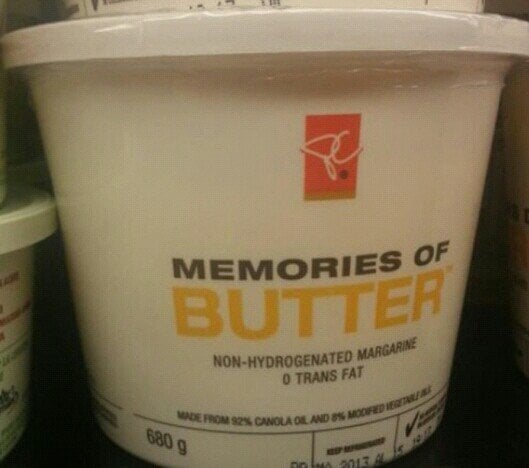A California-based startup called Savor has figured out a unique way to make a butter alternative that doesn’t involve livestock, plants, or even displacing land. Their butter is produced from synthetic fat made using carbon dioxide and hydrogen, and the best part is —- it tastes just like regular butter.
It’s a synthetic saturated fat, so basically a synthetic margarine. Butter is made from milk. So the headline should read “[…] makes ‘margarine’ out of water and CO2”, but everybody hates margarine, so I get why they chose butter instead.
Hey, I like margarine…
Give me Kerry Gold or give me death
Really? I don’t mind it as a substitute for baking, but for eating on bread or using it to fry something I don’t think it comes even close to the flavor you get from real butter.
Oh, butter is better, sure, but my preferences are not mutually exclusive.
For example, I like salads without dressing, though salads with dressing taste better. Does that mean that we must ditch all salads without dressing? I hope not.
“I’ve tasted Savor’s products, and I couldn’t believe I wasn’t eating real butter. It tastes really good—like the real thing, because chemically it is.” Bill Gates recently wrote in his blog post.
If it’s chemically the same as butter, should we call it butter or something else?
“I can’t believe it’s not chemically manufactured butter!”
Margerine is made from unsaturated fats, though. So it’s not the same. Is it?
~I can’t believe it’s not~ BUTTER
Processed butter food
My thought was “I doubt you can make fat only with hydrogen and carbon”, but fats/lipids are literally hydrocarbons. Adding other elements changes the taste, so it isn’t necessary to have mammals anywhere in the production chain.
Very interesting and probably not the first time this is/has been done. It seems quite obvious.
It’s quite obvious at a theoretical level but not easy in terms of figuring out the actual process. A lot of science like that.
According to the savor team, it was quite easy for them:
“We start with a source of carbon, like carbon dioxide, and use a little bit of heat and hydrogen to form chains which are then blended with oxygen from air to make the fats & oils"
I want to guess they are glossing over a complicated enzyme they created, or other form of reagent.
That’s like saying you can build a nuclear bomb by smashing pieces of uranium together. Technically true, but it’s a lot more complicated than that.
Yeah, they’re definitely glossing over a lot of things. They don’t even mention the source of co2 or even a real timeline.
Adding other elements changes the taste,
This is not how chemistry works at all.
To start with, fatty acids also need Oxygen because of the COOH and OH group of the glycerin in fat. They are not hydrocarbons. You know what also is just made of Carbon, Oxygen and Hydrogen? Hundreds of thousands of molecules. All sugars and carbohydrates. If you allow for Nitrogen too, you could cover most molecules found in biological life.
None of this has any bearing on how difficult or complicated it is to synthesize these from more basic molecules like CO2 or H2.
Something I wondered with this, is that butter/margarine/similar need an emulsifier. They consist of basically 80% fat + 20% water, which would not normally mix, but then you add an emulsifier and they do.
There’s lots of different emulsifiers. In butter, it’s apparently mostly casein. My margarine lists lecithin and glyceride.
And well, looks like glyceride consists out of lots of H, C and O, so I’m guessing that’s probably what they’re using in this process…

What on earth is that picture?
Canadian brand (President’s Choice) that apparently has a “memories of” product line.
the best part is —- it tastes just like regular butter.
Yeah, never heard that one before. Weird how every non-whatever replacement foodstuff tastes just like the original… literally 0% of the time.
Butter is one of the few that I legitimately can’t tell the difference between the real thing and the vegan alternatives (some of them).
Cheese is the opposite. Not only have a never had a vegan cheese that tasted like real cheese, I’ve never had a vegan cheese that tasted good.
I want that vegan blue cheese that won the competition and then got disqualified by dairy industry corruption
Have you tried good proper butter? Not that weird white stuff Americans make. Actual flavourful yellow Irish butter.
Margarine tastes okay and I use it all the time, but it’s a pale imitation of the real thing.
Yeah, I have. If you put that and a good vegan butter substitute on toast back to back, I might be able to tell the difference, but if you put them in a dish, I definitely wouldn’t. Yeah, margarine isn’t very good. There are much better substitutes than margarine.
Idk, every vegan butter I’ve ever had (4 different ones now) taste like the crappy diner butter that comes in a little paper boat with the thin paper film over the top. It’s fine I guess, but “butter” is overstating what is really just a barely spreadable, low taste spread.
Yeah, being from the northern part of Spain I have tasted plenty French butters, I still prefer margarine. Taste is subjective so it’s better not to have prejudices about food since those prejudices might be from someone with different taste buds.
French butter like Prèsident is so good, better than Irish butter in my opinion.
And that’s considered one of the fairly inferior choices.
Oh no doubt, I saw it in Walmart though so it was easy to try
I want to try non dairy cheeses but they’re all so so bad it makes me sad. And super expensive for being bad!
Ever since I’ve had to go dairy-free due to sudden lactose intolerance, I’ve had to learn the sad world of vegan cheese. And, the thing that I’ve learned is that almost all the makers have this obsession with coconut oil, the smallest amount of which I can taste—giving the cheese an “off” taste—and which gives me heartburn.
They make pills that you can take that have the enzyme to digest lactose for you. If you eat one before dairy, you shouldn’t have any ill effects.
Appreciate your taking the time to respond. Unfortunately, I’ve got plenty of those, and they’re sadly not a silver bullet… 😞
You should be able to eat cheese that has been matured for 6 months or more for example cheddar, just make sure it actually is matured for that long, cheddar can be sold as 3 to 24 month. I am assuming it is 3 if nothing is specified, younger cheddar is sweeter so I wouldn’t be surprised if most cheddar in your store is that young like those hamburger slices. Everyone except me in the family has lactose intolerance and are very sensitive but can all eat 6+ months matured cheese. Which is great because that was the only kind of cheese we all liked anyways.
lactose sensitivity can be different from person to person so maybe you can eat a younger cheese. Cheese that had a low lactose from the start could be enough for you or just a few weeks maturing. 6 months is just something that has always worked for us without the need to know how much lactose there are.
Appreciate your taking the time to respond. Unfortunately, while I know all this, it doesn’t quite line up with my experience. I’ve seen the difference between an aged cheese like 3-year cheddar and American. But, there’s still a reaction to the cheddar, even if slight. (And, yes, I’ve had the allergy tests…)
So, I’ve found it safest to go with vegan cheese, particularly when the cheese I really want is American (or, at least Gruyère). Unfortunately, I never could get into breakfast sandwiches or burgers with cheddar—the stuff just breaks too easily.
That is too bad :( I am also not a fan of the taste of vegan substitute. I love cheese so I really hoped the info could help you. American cheese does not follow the same strict regulations as European (very traditional) so that could be even more tricky. I really hope you will find a substitute that can at least taste good.
I don’t know about international food, but the German vegan meat companies like Rügenwalder Mühle and Like meat have made huge leaps last year. Mortadella, Fleischwurst, Schnitzel and Chicken Nuggets all taste almost identical to the original. Ground “meat” is close, but you have to chose the right kind for each recipe. More complex stuff is still really bad tho. I say all of this as a passionate vegan meat hater.
Quote Randy Marsh from South Park, while tasting the impossible burger… “Wow this sucks. People actually eat this?”
They’re not bad, on par or better than most frozen grocery store hamburger patties, and way better than the vast majority of fast food burger meat. No, they’re not better than a hand ground 80% lean sirloin patty, but they could easily replace what McDonald’s uses without their customers batting an eye.
I’m disappointed that Impossible Burger is the one available at most restaurants, because the Beyond Burger tastes way better imo.
There are some decent replacements, I was amazed by the vegan foie from hello plan foods. Almost all the taste without the horrible feeling of guilt.
https://www.helloplantfoods.com/_foie-gras-plant-based/
For foie specifically, it’s worth to try to find alternatives due to the creation process of the original being so bad that it’s basically banned outside of Spain and France.
Yeah I’m a meat eater and I wouldn’t touch foie gras. Fucking horrible
During WW2, due to the food shortage, Germans did this using the carbon from coal… The process is old and known.
https://en.m.wikipedia.org/wiki/Margarine#Coal_butter
Let’s see if the process can be made more efficient this time. Allegedly, the product was virtually indistinguishable from butter.
Allegedly, the product was virtually indistinguishable from butter.
Well it says
Margarine made from them was found to be nutritious and of agreeable taste
Doesn’t sound indistinguishable to me.
It is just regular margarine, and for me, it is inedible. Tastes like vaseline.
Yo this would be great for some actual proper carbon sequestration. Make some butter from the air and pump it back down into the wells.
It’s like a very limited Star Trek replicator. It can make anything you want as long as it’s butter.
So I have limitations with videos, but the argument that capturing carbon is costs more energy than it took to put into the air is valid as long as we’re still dumping carbon in the air. But, we have to stop putting carbon in the air and we have to start taking it out again.
completely agree with you, but until the whole world stops dumping it in the air (classic) carbon capture is worthless. I’m interested if this thing of making butter can be worth it, because you’re not just removing CO2, you are also making something that would have required farming a cow, which is much more resource intensive.
I guess we’ll need some studies done on the topic
If it tastes and spreads like a tub of Land o Lakes then I’ll probably try it. I don’t care where the hell it comes from as long as it tastes correct.
Wait. So a “butter star” is possible?
Once one is discovered, there will be a NASA mission to bake a gigantic loaf of bread and launch it at the butter star.
And Musky’ll have a tantrum trying to race a croissant at it first.
Sounds like margarine with more chances to shit myself
Margarine is made of hydrogenated oil. This is chemically identical to the fatty acids in butter. It’s not an alternative for dietary purposes, it’s just a more planet friendly solution.
actual margarine is getting hard to find in stores around here, and when you do it’s priced almost as high as a non-sale price of real butter. margarine has 80% fat content and similar baking and cooking properties as butter.
what’s on store shelves is a cheapened, watered down product laced with extra chemicals and fillers, ranging from 25-40% oil and can’t even make a proper box of mac & cheese. some of them don’t even melt when put on toast, hot, right from the toaster.
I think it’s closer to the coal butter synthesis but maybe they found a more efficient method using other carbon sources
The process required at least 60 kilograms of coal per kilogram of synthetic butter.
I see you didn’t read the article
Basic internet etiquette. Never read the article. Disagree with everyone. You are always right. Everyone else is always wrong etc.
You are absolutely wrong.
Carbo-LEO.
“You see, we take all that bad stuff we learned from Oleo pantshitting technology, and then we move it around. Now we have ‘Carbo-LEO’'.”
Found the guy who failed high school chemistry.
I love it when foodstuffs get put in scarequotes.
Lube based butter product sounds delicious.
The problem with making carbon into butter is it will just be released once someone eats it and burns off the calories. BUT, I think you can make soap from just about any oil. So you could turn carbon from the air into fake butter, turn that fake butter into soap, and then store the soap in caves, solving any potential soap shortages for the next several millennia while also solving the climate crisis.
Butter is already made from carbon. They’re creating the same hydrocarbon chains that are in the fatty acids that butter is comprised of, just without the cow.
Also, for anyone who thinks that carbon bound up in fatty acid chains in butter is released back into the atmosphere through metabolism, I will direct your attention to the population US Midwest and Great Plains. These people have been proving that you can effectively sequester butter for many decades.
To be honest, people probably cause more environmental damage from releasing methane after eating butter. Lol
Luckily methane, while a potent greenhouse gas, breaks down in the atmosphere quickly. It does break down into CO2 and water, so the question quickly becomes: “are the farts of Midwesterners more potent than the amount of CO2 taken out of the atmosphere by making butter?”
My quick guess is luckily, no, they are not. Some amount of the butter will be stored in fatty tissues which will be sequestered 6 feet underground in a cement box eventually. Most will be shat in liquid or semi-solid form into a toilet to be processed by waste management. As long as they are responsible and compost it into nitrate rich fertilizer we should stay very comfortably ahead of the FBI (Fart to Butter Index).
There’s nothing good about methane release. It’s 80 times more potent than carbon dioxide as a greenhouse gas. After ~12 years, it breaks down into CO2 and water, both of which continue to contribute to the problem, since water vapor has no easy way to return to Earth once in the upper atmosphere.
Human farts are not a concern, but cow farts are a huge contributor to climate change.
I definitely understand that. My commentary is mostly satire based in fact. Hence the FBI at the end.
I figured, but the first part concerned me. There are a lot of non-scientific comments on this post in a science community. I was being overly analytical. Sorry about that.
Isn’t that what it’s always been made of?
Hydrocarbon chains? Yes. The success is that this process doesn’t involve cattle.
Germany managed to make butter out of coal during WWII.
Nobody,
My darling,
Could call me
A fussy man -
BUT
I do like a little bit of butter to my bread!"
Don’t want to be a hater but doesn’t this basically create fat without nutrients? It feels like this is reinventing margarine albeit in a cool way.
well fat is inherently a nutrient so, no.
They’re the same fatty acids found in butter. Margarine is hydrogenated oil.
They’re from the same class yes, but is it also going to contain vitamins A, D, E and K2 or contain fatty acids like Conjugated Linoleic Acid or Butyric acid?
I’m trying to point out that factory produced fats will most likely lose out on the health benefits of butter as a source of fatty acids.
They will “enrich it” like the do with bread and other highly processed product with non bio digestable supplements for propaganda purposes.
The article mentions that they added vit A so it gets the yellow color and I’m pretty sure they’re not going to add CLA or other vitamins to be competitive with butter.
Meanwhile there’s a cheap food supplement that you can give cows that reduces methane burping by 90%.
Is it as bad for your health as hydrogenated oils?
Even if it is – I’m interested in seeing how it performs. Feed some rats 3-5x the recommended amount, see what happens. Have some long term studies.
If it is the same as what we use, right now, for a lessened cost or environmental impact, that is still worth exploring.























